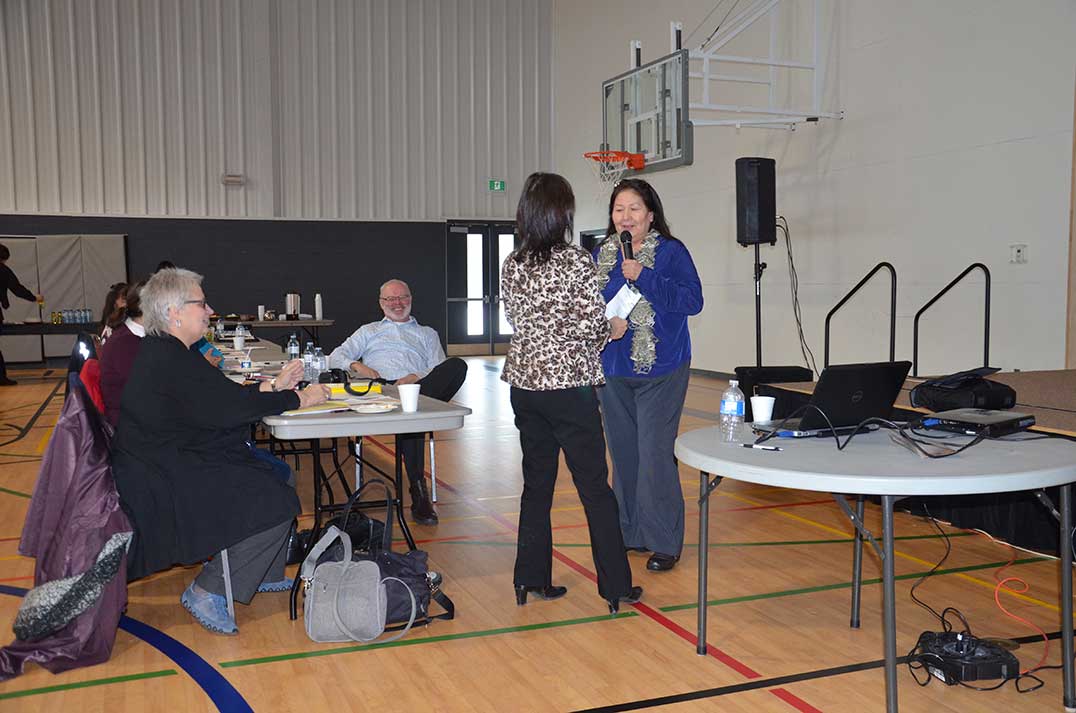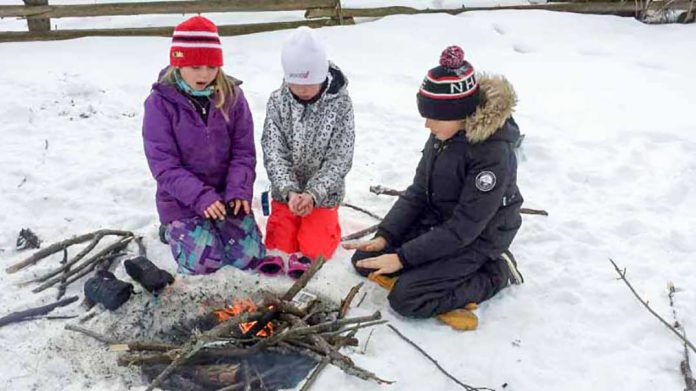AUNDECK OMNI KANING—The main hall of the Aundeck Omni Kaning multi-use centre can hold a lot of health and social service care professionals and that is a good thing, as its capacity was tested by the turnout to Manitoulin’s first Working with Frail Elders/Vulnerable Persons Living on Manitoulin conference on Wednesday, January 25.
“The reason we are holding this conference for professionals only is that we, that is health care professionals, tend to be surrounded by our own silos,” explained Kim Genereux, Aging at Home navigator at Noojmowin Teg Health Services. “This gathering provides an opportunity to get together to share knowledge, best practices and to learn from each other and the great speakers that have come to share their knowledge.”
Ms. Genereaux noted that plans are in the works for a conference geared toward a more general audience later this year. “If everything goes as planned,” she said.
“This is a very topical subject,” noted Ms. Genereux, “the populations on the Island tend to be older and there are more and more people who are in need of this information.”
Elder Urban Mejaki opened the proceedings with a prayer.
The first speaker, Bill Sanowar, an Ontario capacity assessor, spoke on presenting capacity assessments and powers of attorney. “I spoke about the Substitute Decisions Act, 1992, the legislation that deals with people’s ability to manage property and personal care decision,” he said. Among the things Mr. Sanowar discussed were the process of dealing with individuals who have been found not competent to manage their affairs. “Whether that is because of health issues, aging, Alzheimer’s or other cognitive issues.”

photos by Michael Erskine
He pointed out that if the individual does not have a power of attorney, “with the Public Guardian Act of 1992 we have a process for individuals specifically tuned to assessing capacity.”
As to the conference itself, Mr. Sanowar noted it was all positive. “I think it’s a feather in Manitoulin’s cap,” he said. “Traditionally, for small communities, the approach was to send people to large urban centres where the presenters focus is generally on large urban centres.”
Mr. Sanowar noted another key positive aspect of the Island conference. “It is great to see the police services here as well as hospital staff and community health professionals,” he said. “You don’t get that in larger centres.”
In fact, the capacity assessor had been on Manitoulin earlier in the month to deliver a seminar to the UCCM Anishinabe Police Service. “Usually, I am presenting to hospital boards of directors, or physicians’ groups,” he said.
Karen Rivard, a representative of Indigenous and Northern Affairs Canada, provided a workshop on power of attorney for property on reserves. A key note that she pointed out was that INAC only becomes involved in the process “if the person is normally resident in a First Nation.” ‘Normally resident,’ she explained, means that the person’s home is usually on the First Nation, even though they may be temporarily staying in a health centre or away attending school.
Judith Wahl, executive director of the Advocacy Centre for the Elderly (ACE) and a member of the Law Society of Upper Canada, delivered a presentation on the ‘ABCs of Mutual Capacity, Substitute Decision and Health Decision Making.’
“I think it is a really good thing they are doing this workshop,” said Ms. Wahl. “Providing information around capacity. People are struggling to do it right.” But doing it right isn’t always easy, as there are many gaps and challenges when it comes to dealing with issues of capacity in Anishnaabe territories due to differing jurisdictions and regulations.
Ms. Wahl noted that the Indian Act is written in such broad brush strokes that it really doesn’t deal with the issues. “The actual rules are contained in policy and regulations and those are really, really hard to find,” she said. “I could not find them anywhere on the Internet.” And she is a trained professional.
“This forum is a good start,” she said, adding with a laugh that “this is why I came up to Manitoulin in the middle of winter.” As an avid canoeist, she needs little excuse in the summer.
The Working with Frail Elders/Vulnerable Persons Living on Manitoulin conference was made possible through a collaboration between the Manitoulin Health Centre, Noojmowin Teg Health Centre, Mnaamodzawin Health Centre, Wikwemikong Home Care, M’Chigeeng Home Care, Mnaamodzawin Home Care and Noojmowin Teg’s Aging at Home program.





